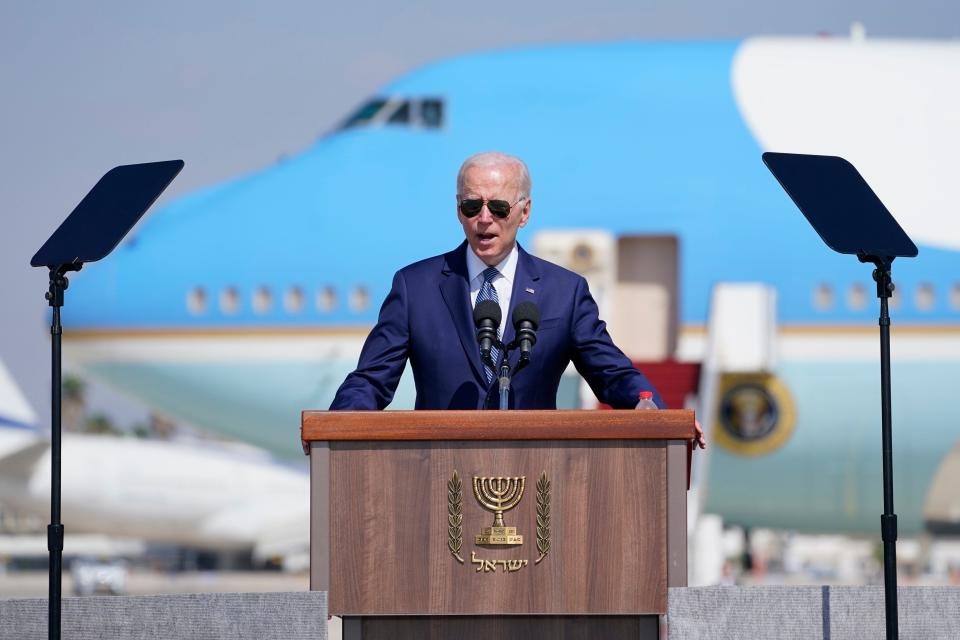Opinion: The Electoral College is nonsensical. The popular-vote winner should always be the president.
- Oops!Something went wrong.Please try again later.
Joe Biden collected 7 million more votes in 2020 than did Donald Trump. But it would have taken just 73,000 votes — a little over 1% of that majority — to reverse the outcome, under the nation's seriously flawed Electoral College system.
There is no reason an American majority should be denied its choice for president. But it has happened in two of the past six presidential elections. A simple correction in the electoral process could ensure that the majority wins — and our nation is making progress toward that condition.
In 2000, Democrat Al Gore collected 50.2% of the popular vote but lost to George W. Bush, who won the electoral college 271-266. In 2016, Democrat Hillary Clinton out-polled Trump by close to 3 million votes out of 128 million cast. But our system, giving all of a state's support to whoever wins that state's majority, made Trump the winner. There were similar errors in three 19th-century elections. Such denials could be easily avoided.
More: Biden democracy challenge: Fix voting and the Electoral College to head off a 2024 crisis
More: Fact check: These 5 election statistics do not discredit Joe Biden's victory
The U.S. Constitution gives authority for electoral vote compilations to state legislatures: "Each state shall appoint, in such manner as the legislature thereof may direct, a number of electors …." That means state legislators are free to adopt the "National Popular Vote" compact. As described by a prime advocate, the nationwide, 1.5-million-member Common Cause organization, it is "an agreement among states to guarantee the presidency to the candidate who receives the most popular votes in all 50 states and the District of Columbia."

Under the agreement, after the national vote is tallied, states — regardless of which candidate their voters favored — would give all of their electoral vote to the national winner.
The new method of choosing a president would go into effect as soon as states totaling 270 electors — a majority — agree to it. Already, 15 states and the District of Columbia have said yes. They carry 195 of the needed 270 electors.
At present, in every state but two (Nebraska and Maine) the state's full electoral vote goes to the state's winner, meaning in a 51-49 split, 49% of voters are ignored. The plan would give voters in every state equal status, because every vote would count toward the national totals, and have the same influence on the national outcome. That means candidates would campaign nationwide, not just in the "swing" states where the vote is likely to be close.
More: How an upcoming Supreme Court case could upend 2024 election laws, lawsuits
In the 2020 Biden-Trump contest, 63% of general election campaign events were held in just four states: Pennsylvania (47), Florida (31), North Carolina (25) and Michigan (21), the most important swing states. In 32 states, the count of presidential election events totaled zero. (Iowa had five.) Thus, most Americans were mere spectators in the lead-up to the nation's most important event.
As it happened, Trump barely lost Arizona, Georgia, Nevada and Wisconsin. Biden won the four states with a combined margin of 73,000 votes — 1/20th of 1% of the total vote in the four states.
In short: More than 155 million Americans voted. BIden's total was more than 7 million greater than Trump's, and the wishes of that healthy majority could have been erased had just over 1% of them — those 73,000 in four states — changed their minds.
The nonsensical electoral-vote system should be corrected before the 2024 election. Iowa should join the effort.

Bill Leonard is a retired Register editorial writer.
This article originally appeared on Des Moines Register: Opinion: Popular-vote winner should always be president

